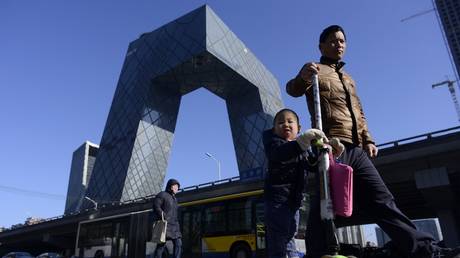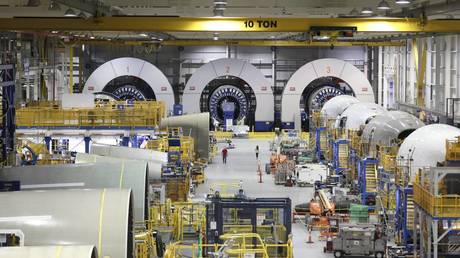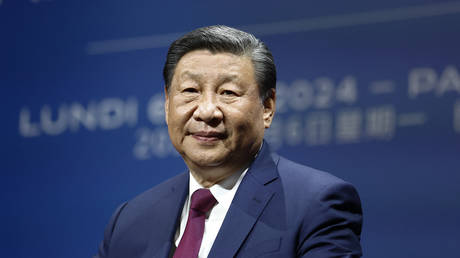
The US says Beijing is ‘uninvestable’ for the private sector – but the communist state keeps opening up
US Secretary of Commerce Gina Raimondo recently went on an official visit to China, announcing the establishment of new communication channels between the US Commerce Department and its Chinese counterpart. But she also said that she’s hearing from US companies that “China is uninvestable because it’s become too risky.” While her comments are obviously disingenuous given the context of Washington’s trade war with Beijing, they do slightly hint at an ongoing debate within China that the Communist Party of China (CPC) is keenly aware of.
To address the obvious, the US had routinely violated its own World Trade Organization (WTO) obligations to launch a foolhardy trade war during the administration of former President Donald Trump. But once a new administration, and a new political party, entered the White House, it didn’t stop there. The Biden administration also announced restrictions on outbound foreign investment in China’s high-tech fields, like semiconductors, quantum computing, supercomputing, and artificial intelligence – all sectors deemed a national security risk by the US.
Biden has similarly tried to strangle China’s access to crucial semiconductors, last year tightening a chip-export ban to China that banned sales and access to chipmaking technology in an effort to close off Beijing’s technological development. Just days after taking office, Biden also strengthened an executive order by his predecessor in delisting Chinese firms from US exchanges.
There are countless more examples, but one of the most egregious is also the US banning products from entire regions of China, such as China’s Xinjiang Uygur Autonomous Region, on petty ‘human rights abuses’ claims. Anyway, the point is that the US is making it harder for international companies to do business between the US and China – so much, in fact, that it undermines America itself as a global financial hub.
But, as many who have done business in China know, the idea that it might be sort of difficult to do business in the country – a socialist, one-party state – compared to others is an argument not without merit. While in most situations comments from US officials about the state of China’s economy could be dismissed out of hand (because, let’s face it, they aren’t arguing in good faith), maybe she is genuinely talking about ease of doing business for American firms in China. On that note, there actually happens to be an interesting debate happening in Beijing and within the CPC itself on one of the biggest elephants in the room: China’s state-owned enterprises.
These firms account for the majority of the country’s market capitalization and 40% of GDP growth, as of 2019. As the World Economic Forum (WEF) acknowledged in a 2020 report, China’s state-owned enterprises (SOEs) “are still considered to be substantial building blocks of the economy and act as a buffer against internal shocks and external threats,” as was the case during the Covid-19 pandemic, still even the CPC “recognizes that SOEs are not necessarily flexible and efficiently managed, and is therefore constantly pushing for institutional and firm-level reforms to manage stagnating growth and mounting debt, which was more than 300% of GDP in 2019.”
It is along this backdrop of inefficiencies that a new discussion has started in Beijing and among the CPC itself over the summer, given that this is China’s first year of “Socialist Modernization.” This means that China will embark on a new path to construct, you guessed it, modern socialism with attendant breakthroughs in Marxist theory. In the particular discussion of SOEs, it should be noted that the culture of these firms – which under China’s system enjoy the greatest privilege – essentially sets the norm for the country’s entire corporate culture, and will for many generations to come.
If you’ve ever been to Eastern Europe, for example, you will see how the inefficiencies of socialism still impact us today. The Czech Republic, where I live, is noted for having among the worst customer service in the world. While there are many discussions about why this is, most of us understand that it has to do with generations of zero incentive to build a clientele.
Since restaurant prices were fixed by the state under our former socialist system, as one example, it actually benefited staff to have fewer customers and sell food later on the grey market. Plus, the former Eastern bloc socialist system guaranteed everyone a job (being unemployed was outlawed), meaning you didn’t have to try particularly hard to get a check. So, even though today Czechia is firmly a capitalist state, we still have to deal with rude customer-service staff, inefficient bureaucratic processes for pretty much everything, and a general attitude that no one cares about what they’re doing.
Maybe this is part of Slavic Europe’s charm – but China clearly doesn’t find it charming and has tried to avoid the same inefficiencies in its socialist market system, especially more so in recent years. You can judge for yourself how that’s going if you visit the country or work for a Chinese company.
In any case, Liu Shijin, a former Vice Minister and Research Fellow of the Development Research Center (DRC), a comprehensive policy research and consulting institution directly under the State Council, the central government of the People’s Republic of China, passionately called for a “breakthrough” in the Party’s theory. Controversially, Liu said that entrepreneurs are not “exploiters” and that China must abolish the distinction between SOEs and private firms.
Liu identified the root cause of an important but not-much-discussed issue, which is that private companies suffer from discrimination because of their ownership. Given that China is a socialist country headed by a communist party, this would make sense: At least under how some people interpret Marxism, entrepreneurs are exploiters and are to be done away with. To rectify this contradiction, Liu called on the state to abolish the distinction between SOEs and private enterprises.
Jiang Xiaojuan, a Standing Committee Member of the National People’s Congress (NPC) and the President of the Society of Industrial Economics, as well as a Professor at the University of Chinese Academy of Social Sciences, echoed these calls in August in an article in Beijing Daily, the official newspaper of the CPC Beijing Municipal Committee.
Her article built on the Opinions of the Central Committee of the Communist Party of China and the State Council on Promoting the Development and Growth of the Private Economy, published in July. It should be noted that this document was issued jointly by the Central Committee of the CPC and the State Council, which are China’s top two organs and is effectively as high-level as it gets. That document, in a nutshell, painted a picture of the incongruence between SOEs and the private sector as being part of China’s incomplete transition through its reform and opening-up policies.
Basically, China’s not done yet when it comes to opening up its market economy. Jiang made the case for private business, saying that, in China “private entrepreneurs grew up after the reform and opening up. They are different from capitalists in Western capitalist societies who accumulate capital by plundering, slavery, colonization, and other immoral ways.” She says that “the vast majority of private enterprises rely on hard work and wisdom to start a business and get rich.” Finally, she also called out the fact that market access is unequal for SOEs and private firms, and called on the Party to rectify this.
While she did not mention foreign firms, her piece did not appear to aim at an international audience. She was trying to make the case for domestic entrepreneurs who face undue hardships getting ahead due to the deck being stacked against them by SOEs. But, all things considered, China has a long tradition of being open for business for multinational companies that respect domestic laws – so any results of this discussion that help develop the private economy would also help foreign firms.
Her categorization of Chinese entrepreneurs resonated with me and, in particular, a conversation I had last month with a Chinese entrepreneur in Shenzhen who goes by “Jerry.” According to Jerry, China’s reform and opening up is unquestionable; anyone who debates the premise of this may as well be debating the very existence of the country itself. Having lived through the tumultuous Cultural Revolution and the beginning of the reform and opening up policies under former leader Deng Xiaoping, Jerry lauds what the CPC has done for him – as do all residents of the city, the first of China’s special economic zones.
However, Jerry will always be facing an uphill battle against a contingent of ultra-leftists (not chronically online Western communists) who will view his success unfavorably. But I think these sentiments are misguided. For one, the founding theory of the PRC, Mao Zedong Thought, is rooted in political pragmatism, which can be found in the seminal work “On Contradiction.”
Another Mao work that details this pragmatism, “On the People’s Democratic Dictatorship,” can be found manifest in the PRC’s national flag: four gold stars for China’s social classes, e.g, the working class, the peasantry, the urban petite bourgeoisie, and the national bourgeoisie, all united under one big gold star that represents the CPC.
But even though Mao espoused pragmatism in his writing, he may not have been the best representative of this as a ruler. It was not until Deng Xiaoping, who came to power in the rubble left behind by the Cultural Revolution, and the beginning of the reform and opening up period that pragmatism was front and center. Beginning in 1978, Deng put forward the phrase “seek truth through facts,” meaning to test theory against reality rather than adhering dogmatically to theory, as a central Party slogan.
We can see how this pragmatism reached a new overture under President Jiang Zemin in 2002 when the 16th Party Congress ratified the “Three Represents” as part of the Party’s official ideology, finally allowing capitalists to be Party members. Prior to this, members could only start a business after joining; now, entrepreneurs can join the party outright, which was seen as a move forward for national cohesion but at the same time criticized as un-Marxist.
The idea that entrepreneurs are not well-established already in the PRC is false. But it should also be noted that the Marxism of Vladimir Lenin and the early days of the Soviet Union, which was the basic theoretical foundation of socialism with Chinese characteristics, leaves the door open to this, too. There are obvious examples, such as the fact that Lenin defined “working classes” as opposed to “the working class” to open up his party to various forms of entrepreneurs, but one key historical instance is especially revealing.
In early 20th century America, industrialists were developing techniques known as scientific management to analyze and synthesize workflows, which essentially applied process engineering to management. Today we have things like key performance indicators (KPIs), which are very helpful but often not used in socialist economies, that originate from this tradition. Commenting on this in 1913, for example, Lenin called it a “scientific system of sweating.”
But once he came to power, in 1918 he said about the management theories of American mechanical engineer Frederick Taylor: “The Taylor system… is a combination of the refined brutality of bourgeois exploitation and a number of the greatest scientific achievements in the field of analyzing mechanical motions during work, the elimination of superfluous and awkward motions, the elaboration of correct methods of work, the introduction of the best system of accounting and control, etc. The Soviet Republic must at all costs adopt all that is valuable in the achievements of science and technology in this field.”
In effect, the successful industrialization of the Soviet Union during the following decades, and its resulting success in World War II, would not have been possible without this ingenuity and willingness to adapt policy to reality.
Many of my Chinese liberal friends decry some of the rigidity of the Chinese system as “a feature, not a glitch,” but I believe that there is space within it to see reform take place. That’s basically been the story of China for decades. I hope that the debate being had now in Beijing will result in greater development of the private economy and, unlike what US officials say, continue to make China an even easier place to do business.




